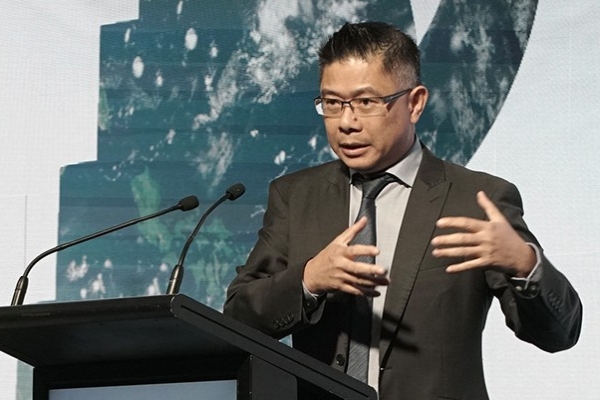Published on the 16/02/2023 | Written by Heather Wright

It’s time to think horizontally, says Mitchell Pham..
To transform your organisation to digital-first, CIOs, CTOs and CDOs must broaden their view beyond the traditional IT spheres and get more comfortable asking the tough questions.
That’s according to Mitchell Pham, Director of CodeHQ, serial entrepreneur and strategic advisor, who says his experience as an advisor and board member has taught him that business executives can have very narrow bands of perspective built only around the work they have been doing.
“If you want to transform the business, you have to widen your horizon, broaden your awareness across a whole bunch of things that will impact your business the moment you go digital first,” he says. “And you have to take a very strategic approach and tap into a – hopefully diverse – board of directors, and also involve your customers, partners and suppliers in your journey.”
Pham, who chaired NZTech, FinTechNZ, Digital Council for Aotearoa and the ASEAN Business Alliance, and now co-chairs Kea Global, is a keynote speaker at next month’s Digital First conference in Auckland, where he will delve into the many areas CIOs need to be across to be truly ‘digital first’.
Those areas include emerging technologies, digital inclusion, trust, cybersecurity and ESG, but also extend into understanding the wider tech sector’s diversity and maturity, and government, business and regional trends.
“Horizontal awareness is key to inform your strategy and demonstrate that you are aware of the risks and the opportunities.”
“Transforming digitally isn’t just looking at how you change internally to become more efficient. It is much more strategic than that and involves a lot of external factors,” he says.
“There are a lot of things going on across the digital world that are really important for businesses to be aware of.”
Take, for example, digital inclusion. While governments are looking to ensure citizens aren’t left behind in the move to digital, for businesses it’s about ensuring none of the existing customer base is left behind.
The contentious area of digital trust is also crucial. Hard to earn, and very easy to lose, trust is a key lynchpin for business, but surveys show there are significant and growing numbers of consumers who don’t trust large public and private institutions..
So how can a company develop and maintain trust when they go digital?
“A key approach is to include the end customers or stakeholders in the journey. Whoever your technology impacts, whether they’re going to be using that technology to engage with the business or are going to be impacted by what the business does with digital technology, it’s important to include them in the entire process.”
That’s not just about getting their views and input to enable you to refine the offering, but also, crucially to ensure they feel they have been included and a sense of ownership.
“So you as a business are providing them with a new way of doing business with them, and actually they’ve had a say in it, they have some sense of ownership in how you are dealing with them now,” Pham says.
Transparency across all facets of a transaction or engagement and even how you govern the development of the technology used, is crucial for both earning and maintaining trust, he adds.
He also cautions Kiwi organisations to pull back on the DIY.
“When they take on digital transformation, New Zealand businesses tend to self-develop everything when in fact there are plenty of offerings already developed, proven and tested by companies that specialise in those areas and will be able to do it better than you can.
“If you need to transform your business and bring technology in to make it more efficient, that’s not new innovation, so look towards the tech industry to see what is already there.”
Even if you are developing technology that is truly new and unique in your industry, a partnering model will likely be more successful.
Pham says businesses often don’t think laterally enough when they approach going digital first and says models like ventures and collaborations enable organisations to partner to get to the end state faster and to scale more rapidly.
“If you are going to become a digital first business you have to make sure your governance structure supports that – that you have the right people onboard, and you have the support of the board and the executive team.
“This awareness of trends shapes your strategy. And then making sure you have the ability and skills and the right people to execute and know when to not DIY, when to partner.
“So governance, strategy, execution then becomes quite interlinked, and key enablers to either make or break your digital transformation or innovation journey.”
Pham says CIOs need to be asking themselves, and their organisations, the tough questions.
“It’s the CIOs, CDOs, CTOs who need to be asking the questions. They are the ones who can take all these things and educate the key stakeholders as to why the questions about governance, strategy and ability to execute are so important,” he says.
Pham says he’s seen brilliant executives stopped by boards who, while very capable, don’t have the right background to confidently make or back decisions on digital, so instead either don’t take any risks, or end up taking risks they don’t understand nor know how to manage.
IT executives, he says, can provide the reassurance and confidence for the board to move ahead with digital.
“Horizontal awareness is very, very key to inform your strategy and to demonstrate to stakeholders that you are aware of the risks and the opportunities.”
Pham will be speaking at the Digital First 2023 event on 7 March 2023 in Auckland. See more, and book tickets, here.



























